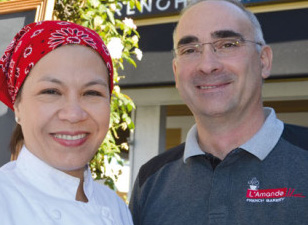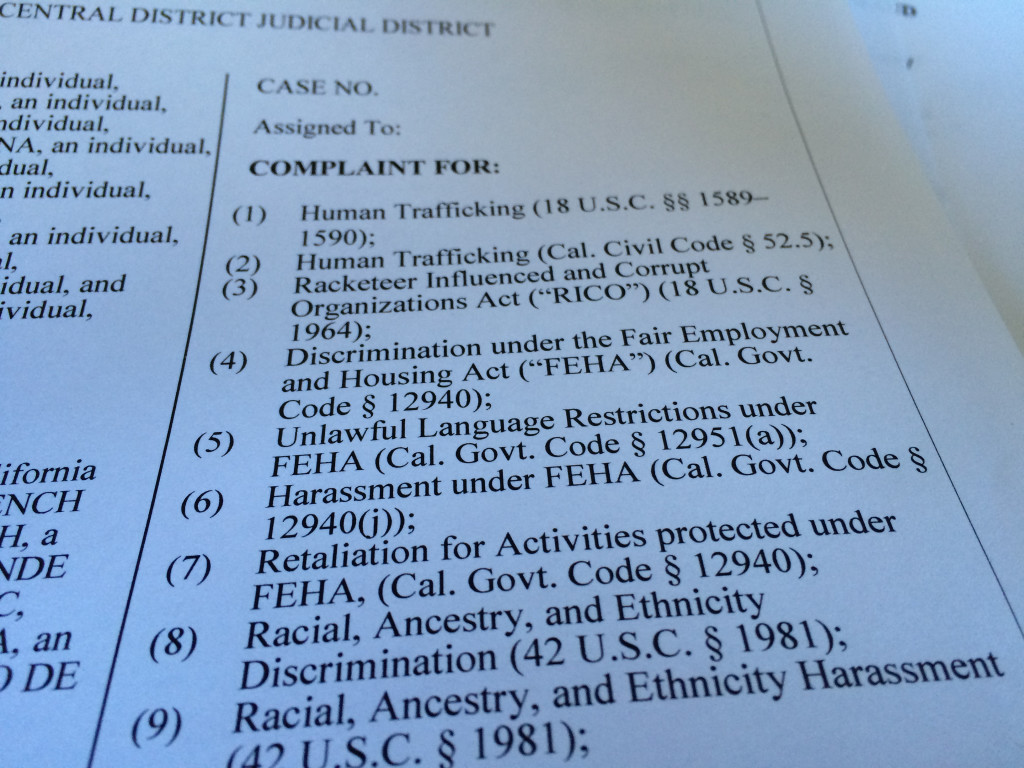 THESE ARE NOT THE WORKERS. This is a picture of Analiza Moitinho de Almeida, the daughter of a powerful and wealthy Filipino government official, seen here with her husband, Goncalo.
THESE ARE NOT THE WORKERS. This is a picture of Analiza Moitinho de Almeida, the daughter of a powerful and wealthy Filipino government official, seen here with her husband, Goncalo.
The two met in Switzerland, where Ana had attended boarding school, then hotel school.
What they learned they put to use in Manila, serving up fancy French delicacies, and then in California.
But what of their ethics? In the U.S. dollar world, some Filipino workers claim the couple’s ethics were still operating in the peso world.
The couple and their California corporations are named as defendants in a lawsuit filed by 11 Filipino immigrant workers in Los Angeles.
The plaintiffs, all poor Filipinos, claim they were lured to the U.S. under false pretenses in an investor visa fraud scheme concocted by the Almeidas.
The workers are asking for back pay, overtime, penalties and damage that could be in excess of $1 million dollars.
The Almeidas have not returned my phone calls. But I was able to talk to three of the workers who are plaintiffs in the case.
My original column on the workers was published in the online version of the Manila-based Philippine Inquirer.
I have re-posted my opinion/commentary column here:
IN CIVIL LAWSUIT, 11 FILIPINO NATIONALS IN CALIFORNIA ALLEGE SCION OF PROMINENT FILIPINO ENGAGED IN FRAUDULENT IMMIGRATION SCHEME By Emil Guillermo
On the phone, the woman was so scared for herself and her family in the Philippines, she will only go by the name “Nora.”
In 2011, she was working at the Le Coeur de France bakery in Manila when she was approached by the former owner, Analiza Moitinho de Almeida, who had moved to the U.S. Almeida, the daughter of Philippine Social Security chair Juan B. Santos, was starting a new bakery in Los Angeles—L’Amande Bakery–and asked Nora to come work for her.
Nora said Ana offered $2,000 and an E2 visa. It’s a temporary visa, good for five years for skilled workers to America. Ana took care of everything for Nora and ten others. She is alleged to have made up some things in the paperwork to get the visas.
An E-2 visa is for skilled workers. But when Nora and the others arrived, they were put to work as household domestics, doing dishes, cleaning, cooking and yardwork for Almeida.
On top of that, she said they did other manual labor like cleaning of Almeida’s rental properties.
Oh, and the pay? Not $2,000 a month. Try $360 a month, according to Nora and the other workers. About the same amount that the workers got if they stayed put in their old jobs in Manila. But this was Los Angeles not Metro Manila.
Never mind. They said they stayed together in the Almeida’s laundry room, sleeping on the floor.
Did they even have a banig?
“Nora” began crying when I talked to her and she recounted her tale. I asked her if she felt like a “slave”?
“Opo,” she said. She wasn’t allowed to leave, and when she finally brought up the pay discrepancy she was threatened by Almeida.
She said she and the others were told they would have to repay an $11,000 debt for being brought to America.
Debt of $11,000?
That’s not slavery. That sounds more like “indentured servitude.”
Nora, 47, said she felt trapped. Like many of the others, she had had a working relationship with Ana and had known her for a dozen years or more. They trusted her on the offer to come to America. They didn’t think it was a scheme for cheap labor.
For Nora, it was a dream opportunity—a way to send dollars back to the peso world, to help her family mired in poverty. But she didn’t know anything about the paperwork, about the visa. Ana had taken care of all that, she said. And when the suggestion came up to leave, Nora said Ana threatened them.
“I’m very afraid for my family,” Nora said. She said she feared Ana wouldn’t hesitate to use any connections back home.
Already there have been knocks on some of doors of family members, she said. “I regret that I joined Ana here,” Nora said tearfully. “If I stayed, I would not have endangered my family.”
Nora was so fearful she would not use her name. But at least she talked to me.
Two others did as well. But they had a sense of justice that allowed them a bit more courage.
They’re using their real names.
Louise Luis, 40, and left her partner and son Mat in Quezon City when Ana offered her a job doing logistics for the new bakery in America. She sent home most of her money to the Philippines to provide a better life for her son. But she paid a price. She said she was overworked, and underpaid. And when she confronted Ana about her treatment, Louise said Ana scolded her like she was an ungrateful infant.

“I thought of leaving a lot of times,” Louise told me. But Ana being from a prominent family was intimidating to her.
“I know Ana is wealthy and very powerful in the Philippines. Her father is wealthy and powerful and influential…And if you know the Philippines…when you’re wealthy and you know some people, you have body guards.. You can do things to people who don’t have money.”
That was the peso mentality that ruled and dominated the Filipino workers brought over by Analiza Moitinho de Almeida.
Ana’s position as a member of the Filipino elite, the daughter of the former chair of Nestle Philippines, and the current chair of the Social Security system in the Philippines, had as much to do with her ability to rule over the workers as anything else, according to the immigrant plaintiffs.
Even in America.
Another worker. Romar Cunanan, 33, felt similarly. He said the pressure of having an $11,000 payment hanging over his head, as well as the fear of harm to his family in the Philippines was too much to bear. But he also felt strange working for Almeida once the bakery opened.
The L’Amande bakeries in Beverly Hills and Torrance weren’t “point-point joints.” They didn’t serve halo-halo or Ube rice cakes and bibingka. They were fancy French places with omelets in the morning and Croque Monsieur sandwiches in the afternoon.
The Filipinos were told to work in the back and stay there. The restaurants in Beverly Hills and Torrance were for whites, they were told. They were told not to speak Tagalog.
It practically made Romar feel sub-human. Definitely “less than.” And this was on top of getting a fraction of the $2,000 a month he was promised.
What made him feel better was his ability to help his family.
Whatever he made, he sent the lion’s share back to his wife and two sons. He told me leaving them behind remains “the hardest decision he has made in his entire life.”
And now like the others, he is facing a legal battle and fears of retaliation. A member of the legal team said there are provisions that might allow for the employees to get new T visas. They are for those victimized by traffickers.
The legal complaint states: “The workers bring this action against Defendants for labor trafficking, racketeering violations, labor law violations, unfair competition, employment discrimination and retaliation, unfair immigration-related practices, and common law claims.”
A new T Visa would allow the workers the ability to live and bring their endangered families from the Philippines to America. That wasn’t in the plans at first. It is now.
Louise says once the bakery opened, they got the $2,000 they were promised, but it didn’t add up after all the extra hours at the bakery and at the Almeida home.
“We worked 14 hours a day without overtime pay, breaks, and no day off, “Louise said.
California’s department of labor did conduct an investigation. There still may be a criminal complaint, but Louise and the others learned they also had rights.
They spoke up against Ana and were fired. At that point, they decided to contact Asian Americans Advancing Justice in Los Angeles. It was time to fight.
“I want justice for what happened to me,” Louise said. “I still want to pursue my dream, save (money) and be with my family. …But I have to make this right. I need justice. I fear, but I know I’m doing this for a good cause—for Ana to stop what she’s doing… I hope this thing that happened to me won’t happen to anyone.”
She hopes the “T” visa application comes through so she can start working.
But she’s not going to stop talking. It’s different for Ana Moitinho de Almeida and her husband Goncalo.
I made several calls to them once the lawsuit was announced.
The person who answered at the bakery said reporters were “vultures,” and hung up.
A court will decide who the vultures are.
(My original Philippine Inquirer column is here).
CHECK OUT THE NEW HOME FOR THE AMOK COLUMN: www.aaldef.org/blog
LIKE and FOLLOW us on Facebook: http://www.facebook.com/emilguillermo.media
And FOLLOW my latest tweets on Twitter http://www.twitter.com/emilamok




